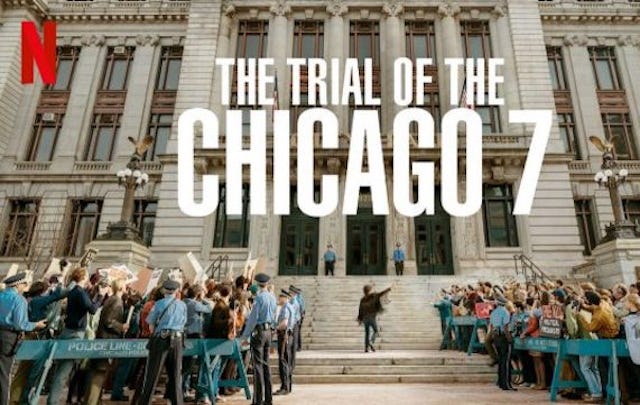My old friend Wayne Slater, the former senior political writer for The Dallas Morning News and co-author of the NYT-best selling Bush’s Brain: How Karl Rove Made George W. Bush Presidential, was reminded of his college days recently when Netflix released The Trial of the Chicago 7.

by Wayne Slater
The arrival of The Trial of the Chicago 7 on Netflix makes me think of William Kunstler, the famed radical lawyer who represented that colorful band of hippies, Yippies and anti-war protesters targeted by the government after the violent counterculture protests at the 1968 Democratic Convention in Chicago.
Kunstler was the most famous lawyer in America the week he came to West Virginia University, fresh off the conspiracy trial and the cover of national news magazines.
The Chicago 7 were accused of disrupting the convention and Kunstler led the flamboyant legal defense (including the brilliant Mike Tiger who would in 1993 help defend Kay Bailey Hutchison in Texas against charges of official misconduct) in the biggest political trial of the tumultuous ‘60s.
When he arrived on campus in 1970 on a speaking engagement, Kunstler was the embodiment of racial chic – long hair pulled back behind his ears, suit coat fashionably disheveled, his rugged features instantly familiar from TV.
Students jammed the student union for his speech and cheered wildly.
I had nothing to do with Kunstler’s appearance, but did weasel my way into a small entourage of students who took him afterwards to the campus coffeehouse, The Last Resort, for poetry and folk music.
Kunstler took the stage and read Yeats. An acoustic group sang something about revolution. In such an orbit, you might believe the world was filled with possibility.
That’s when I suggested that we take Kunstler to my fraternity house.
It was past midnight when we arrived, the front-porch lights blazing against the white pillars, soul music booming from the windows. Beer was flowing from kegs, upstairs and down.
My Phi Kappa Psi brothers seemed a little wary at first. Some had no idea who he was, but others knew vaguely that he was associated with political radicals they’d seen on TV. Beer was available, but Kunstler asked for a cream soda. From somewhere, somebody showed up with one and Kunstler sat in our spacious living room, chatting with my frat brothers and their sorority dates, clearly having a great time.
After awhile, Kunstler wandered downstairs where he found Bear Crouse, the fraternity’s venerated ping-pong champion. The two began to play and, as it turned out, Kunstler was a terrific ping-pong player.
“Good man!” Bear declared, the frat’s highest compliment.
From that moment, Bill Kunstler – a Good Man – was one of the brothers. He might have been America’s most radical lawyer, defender of Jerry Rubin and Angela Davis and the Black Panthers – but he could play ping pong like a pro. And in the curious calculus of the frat house, that was a measure of merit.
As the night wore on, Kunstler charmed everyone.
The last time I saw him, he was driving off with a WVU cheerleader in her Volkswagon bug.
The world, indeed, was filled with possibility.
What do you think of today's email? I'd love to hear your thoughts, questions and feedback. I might even put ‘em in the newsletter if I don’t steal it outright.
Enjoying this newsletter? Forward to a friend! They can sign up here. Unless of course you were forwarded this email, in which case you should…
Forget the Alamo: The Rise and Fall of the American Myth comes out June 8 from Penguin Random House. There is no better way to support this book than to pre-order a copy. You’re going to love reading what really happened at the Alamo, why the heroic myth was created, and the real story behind the headlines about how we’re all still fighting about it today.
I’ve lost 35 pounds this year with Noom, and haven’t had to cut out any foods. Noom is an app that uses psychology, calorie counting, and measuring activity to change your behavior and the way you think about food. I’m stronger and healthier than I’ve been in years. Click on the blue box to get 20% off.
If this newsletter is of some value to you, consider donating. Honestly, I’m not doing this for the money. I’m writing this newsletter for myself, and for you. And a lot of you are contributing with letters and by suggesting articles for me to post. But some of you have asked for a way to donate money, so I’m posting my Venmo and PayPal information here. I promise to waste every cent you give me on having fun, because writing this newsletter for you is some of the most fun I’ve had. Venmo me at @Jason-Stanford-1, or use this PayPal link.


